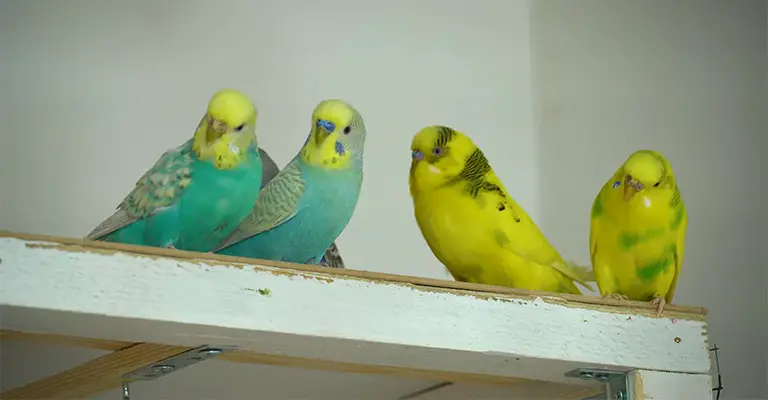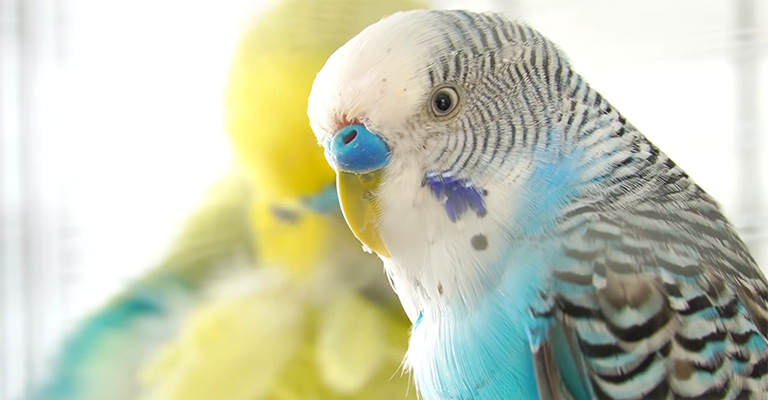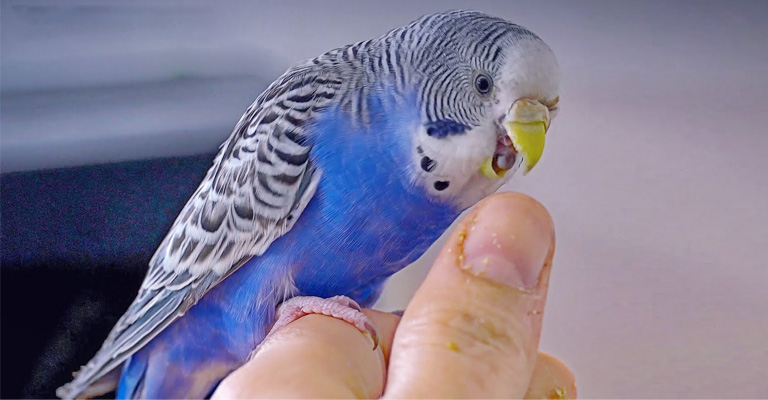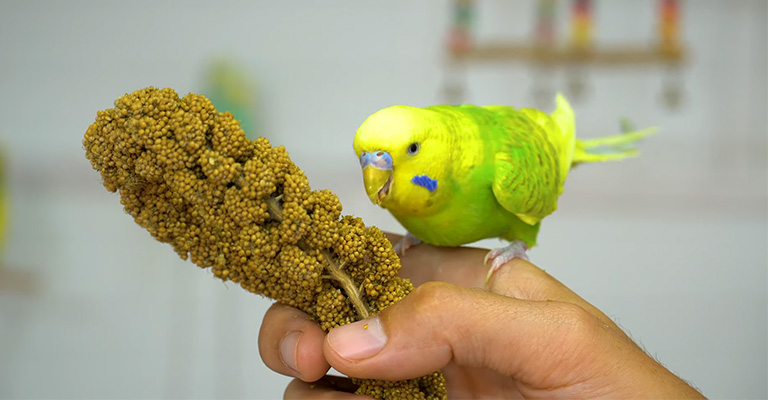Parakeets, with their vibrant feathers and lively personalities, are popular pets known for their intelligence and ability to bond with their owners. However, at times, you may find yourself wondering why your parakeet appears to dislike or even hate you.
While it may be disheartening, it’s essential to remember that birds, like humans, have unique personalities, preferences, and past experiences that can shape their behaviors.
In this article, we’ll explore some why does my parakeet hate me and offer suggestions to improve your bond.

Why Does My Parakeet Hate Me?
Below are the reasons why your parakeet might not like you:
Lack of Trust and Socialization
Parakeets are social creatures that thrive on interaction and companionship. If your parakeet has had limited exposure to humans or has not been adequately socialized, it may find it challenging to trust and bond with you. Building trust takes time and patience.
Spend consistent quality time with your parakeet, providing treats, speaking softly, and engaging in gentle interactions. Gradually, your parakeet may come to associate your presence with positive experiences.
Negative Experiences or Trauma
If your parakeet has had negative experiences or trauma in the past, it may develop fear or apprehension toward humans. This fear can manifest as avoidance or aggression.
Understand that your parakeet’s behavior may not be a reflection of its feelings towards you specifically but rather a response rooted in past experiences.
Establishing a calm and secure environment, free from loud noises or sudden movements, can help your parakeet feel safe and gradually overcome its fear.
Body Language and Approach
Birds communicate primarily through body language, and they are highly perceptive to human behavior.
If you approach your parakeet too abruptly, stare at it intensely, or make sudden movements, it may interpret these actions as threatening or aggressive.
Instead, maintain a relaxed posture, avoid direct eye contact, and move slowly and gently when interacting with your parakeet. This approach will help create a more welcoming environment for your feathered friend.
Lack of Mental Stimulation
Parakeets are intelligent birds that require mental stimulation to stay happy and healthy. If your parakeet feels bored or unchallenged, it may exhibit signs of frustration or disinterest.
Offer a variety of toys, puzzles, and opportunities for exploration within its cage.
Additionally, consider setting up a safe and supervised play area outside the cage where your parakeet can stretch its wings and interact with stimulating objects. Providing ample mental stimulation can improve your parakeet’s overall mood and disposition.
Personal Preferences
Just like humans, parakeets have individual preferences when it comes to social interactions. Your parakeet’s apparent dislike may not be a reflection of your actions or personality, but simply a matter of personal preference.
Some birds are naturally more aloof or independent, while others may be more affectionate and seek constant attention. Observing your parakeet’s behaviors and adjusting your approach accordingly can help you better understand and cater to its unique needs.
How Do You Tell If Your Budgie Hates You?

Budgies are not capable of feeling hatred or harboring malicious intentions. However, they can exhibit behaviors that indicate discomfort, fear, or stress. Here are some signs that your budgie may not be comfortable or happy in its environment:
Aggressive Behavior
If your budgie displays aggressive behavior, such as biting, lunging, or hissing, it may indicate that it feels threatened or anxious. This behavior can be a response to feeling scared or overwhelmed.
Avoidance and Fear
Budgies that are fearful or uncomfortable around their owners may try to avoid interaction. They may retreat to a corner of the cage, fluff up their feathers, or show signs of stress like excessive preening or feather plucking.
Vocalizations
While budgies are generally vocal, excessive or constant squawking, screaming, or chirping that is accompanied by signs of distress can indicate their dissatisfaction or unease.
Flattened Body Posture
When budgies feel threatened or uncomfortable, they may flatten their bodies against perches or surfaces, trying to make themselves appear smaller. This defensive posture suggests they are not at ease in their environment.
Wing Flipping
Rapid wing flipping or trembling can indicate stress or agitation in budgies. It’s a sign that they are not relaxed and may feel threatened or fearful.
Lack of Appetite
Budgies are generally enthusiastic eaters. A noticeable decrease in appetite or sudden weight loss can indicate physical or emotional distress.
Excessive Hiding
If your budgie spends most of its time hiding or refuses to come out of its cage, it may indicate a lack of trust or fear towards its surroundings.
How to Make a Budgie Like You?

Building a positive relationship with a budgie takes time, patience, and consistent effort. Here are some tips to help you make a budgie like you:
Give Them Space
When you first bring a budgie home, it’s important to give them time to adjust to their new surroundings. Place their cage in a quiet area of your home where they can feel safe and secure.
Be Patient
Budgies are naturally skittish creatures, especially when they are unfamiliar with their environment or people. It may take some time for them to warm up to you. Avoid making sudden movements or loud noises that may startle them.
Spend Time Near the Cage
Spend time sitting near the budgie’s cage, talking softly or reading aloud. This helps the budgie get used to your presence and voice. They will begin to associate your presence with positive experiences.
Offer Treats
Budgies love food, and offering them treats is a great way to win their affection. Start by placing treats on the cage door or in your hand. As they become comfortable, you can gradually move the treat closer to your body, encouraging them to come closer to you.
Bond Through Music
Budgies have a natural inclination toward music. Play soft and calming music in their presence. Over time, they may start to associate your presence with pleasant sounds, helping them feel more comfortable around you.
Talk and Whistle
Budgies are social birds and are attracted to human voices and whistling. Speak to them using a soft and gentle tone. You can also try whistling simple tunes, which may grab their attention and spark their curiosity.
Offer Interactive Toys
Budgies love to play and explore. Provide them with a variety of toys that offer mental stimulation and physical activity. This will keep them engaged and help build a positive association with their environment.
Avoid Forceful Handling
Budgies are delicate creatures, and forceful handling can scare or stress them. Let them approach you at their own pace. If they show signs of fear or discomfort, give them space and try again later.
Maintain a Routine
Establish a consistent routine for feeding, cleaning, and interacting with your budgie. Budgies thrive in a structured environment and appreciate predictable patterns.
Be Consistent and Patient
Building a strong bond with a budgie takes time and consistency. Be patient and understanding, and remember that each bird has its own personality and will develop trust at its own pace.
Remember, it’s essential to respect your budgie’s boundaries and not force interactions. Building a bond takes time, so be patient and allow the relationship to develop naturally.
How Long Does It Take to Gain a Parakeet’s Trust?

Gaining a parakeet’s trust can vary depending on the individual bird and its past experiences. Some parakeets may become comfortable and trusting within a few days, while others may take weeks or even months.
It’s essential to be patient, consistent, and gentle in your approach to building trust with your parakeet. Here are some tips to help you establish a bond with your feathered friend:
Create a Calm and Quiet Environment
Parakeets are sensitive to their surroundings, so it’s important to provide them with a peaceful atmosphere. Avoid loud noises or sudden movements that may startle them.
Spend Time Near the Cage
Sit or stand near the parakeet’s cage, talking softly or reading aloud. This allows the bird to become familiar with your presence and voice. Over time, they will associate your presence with positive experiences.
Offer Treats
Parakeets are often motivated by food. Begin by offering small, tasty treats through the cage bars or by placing them in a dish within the cage. This helps create positive associations and encourages the bird to approach you.
Gradually Introduce Your Hand
Start by placing your hand near the cage without making any sudden movements. Allow the parakeet to approach and investigate at its own pace. Once the bird seems comfortable with your hand’s presence, you can begin offering treats using your fingers.
Offer Your Finger As a Perch
Once the parakeet is comfortable taking treats from your hand, you can slowly and gently introduce your finger as a perch. Allow the bird to step onto your finger voluntarily without any force or pressure.
Slowly Build Physical Interaction
As your parakeet grows more comfortable perching on your finger, you can gradually introduce gentle petting and head scratches. Always be observant of the bird’s body language and respect its boundaries.
Some parakeets may never enjoy extensive physical contact, while others may become quite affectionate over time.
FAQs
How long does it typically take for a parakeet to warm up to its owner?
The time it takes for a parakeet to warm up to its owner can vary depending on the bird’s personality, past experiences, and the efforts made by the owner to build trust. It can take anywhere from a few days to several weeks or even months for a parakeet to feel comfortable and bond with its owner.
Can a parakeet’s dislike towards me be reversed?
In many cases, a parakeet’s dislike or aversion towards its owner can be reversed with time, effort, and the right approach. By providing a calm and safe environment, offering treats and positive reinforcement, and gradually building trust through consistent interactions, you can improve your bond with your parakeet.
What should I do if my parakeet shows signs of fear or aggression towards me?
If your parakeet shows signs of fear or aggression, it’s crucial to approach the situation with caution and respect for its boundaries. Avoid forcing interactions or making sudden movements that may escalate fear or provoke aggressive behavior. Instead, give your parakeet space and time to feel safe.
Can a parakeet’s dislike towards me be due to its gender?
A parakeet’s dislike towards its owner is not typically determined by its gender. Both male and female parakeets can form strong bonds with their owners, given the right environment and approach.
What are some signs that my parakeet is starting to warm up to me?
As your parakeet begins to warm up to you, you may notice some positive behavioral changes and signs of trust. These can include approaching the front of the cage when you’re nearby, curiosity towards your presence and activities, and relaxing its body posture and feathers in your presence.
Final Words
That was all about why does my parakeet hate me. While it can be disheartening to feel that your parakeet dislikes you, it’s crucial to approach the situation with patience, empathy, and understanding.
By focusing on building trust, providing mental stimulation, and respecting your parakeet’s preferences, you can work towards strengthening your bond. Remember, every bird is different, and it may take time for your parakeet to warm up to you.
With love, care, and consistent positive interactions, you can create a harmonious relationship with your parakeet and enjoy the joy of companionship that these wonderful birds can bring.